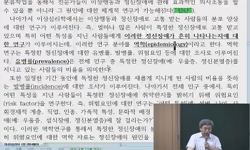수치심은 명백하게 청중(audience)의 개념을 언급하고 있다. 대부분의 경우에 청중은 실제적으로 행위자를 바라보고 있는 청중이다. 일반적으로 x는 x의 행동들을 목격하고 있는 청중 y 앞에서 ...
http://chineseinput.net/에서 pinyin(병음)방식으로 중국어를 변환할 수 있습니다.
변환된 중국어를 복사하여 사용하시면 됩니다.
- 中文 을 입력하시려면 zhongwen을 입력하시고 space를누르시면됩니다.
- 北京 을 입력하시려면 beijing을 입력하시고 space를 누르시면 됩니다.
https://www.riss.kr/link?id=A99551320
- 저자
- 발행기관
- 학술지명
- 권호사항
-
발행연도
2012
-
작성언어
Korean
- 주제어
-
KDC
104
-
등재정보
KCI등재
-
자료형태
학술저널
-
수록면
5-21(17쪽)
- DOI식별코드
- 제공처
-
0
상세조회 -
0
다운로드
부가정보
국문 초록 (Abstract)
수치심은 명백하게 청중(audience)의 개념을 언급하고 있다. 대부분의 경우에 청중은 실제적으로 행위자를 바라보고 있는 청중이다. 일반적으로 x는 x의 행동들을 목격하고 있는 청중 y 앞에서 수치심을 느끼며 또한 청중 y가 x에 대해서 말하거나 생각하는 것에 초점을 맞추게 된다. 그러나 이런 종류의 반응은 단순하게 외적인 자극들(stimuli)에 대한 직접적인 반응 또는 비난에 대한 단순한 공포라고 말할 수 없다. 수치심은 x 속에 내재화된 요소가 x의 상황을 수치스러운 것으로 간주할 수 있는 상황으로 범주화하는 작업을 통해서 그리고 x가 공공적인 조사를 받고 있다는 느낌을 통해서 유발되는 x 자신에 대한 부정적 판단 속에서 발견된다. 연구자는 기본적으로 수치심이 단순하게 타인들의 외적 제재에 대한 공포와 연관시키기 보다는 내재화된 이상에 대한 자기 반성적 고찰의 결과라고 생각한다. 따라서 이 논문에서 연구자는 플라톤의 작품들에서 언급된 수치심 개념이 이와 같은 내재화된 이상에 대한 반성적 고찰을 함의하고 있는지를 살펴볼 것이다. 이를 위해서 연구자는 수치심이 플라톤의 영혼론에서 어떤 역할을 하는지를 고찰할 것이다. 연구자는 수치심과 기개의 관계, 기개와 이성의 관계를 살펴보면서 플라톤의 수치심 개념이 도덕 교육과 어떻게 관련되어 있는지, 외적/내적 제재와 어떻게 관련되어 있는지 그리고 양심의 개념과 어떻게 관련될 수 있는지를 살펴볼 것이다.
다국어 초록 (Multilingual Abstract)
For many, a distinction between shame and guilt is a given. Guilt relies on the internal sanctions provided by the individual conscience, one``s own disapproval of oneself, and shame is caused by fear of external sanctions, specifically the disapprova...
For many, a distinction between shame and guilt is a given. Guilt relies on the internal sanctions provided by the individual conscience, one``s own disapproval of oneself, and shame is caused by fear of external sanctions, specifically the disapproval of others. It is clear that shame bears a frequent, and some would say an essential, reference to the concept of an audience. One feels shame before those who witness one``s actions, and focuses on what the members of that audience may say or think of one. Even this kind of response, however, is not a simple fear of disapproval or a straight forward response to purely external stimuli. The internalized component is to be found both in the categorization of one``s own situation as one which can be viewed as shameful and in the negative judgement of oneself that is caused by the sense of being under public scrutiny. In this article I examine Plato``s concept of shame in his works. The issue is no longer whether shame can be a response to interna1 sanctions rooted in a form of conscience, but whether Plato realized that it could Accordingly, this article focus on the views of the nature of shame which emerge from the works of the great philosopher, with particular reference to its role in his psychology. its connection with their conceptions of moral excellence, their views regarding its reference to external or internal sanctions, and the possible role of shame in any conception of conscience they may possess.
동일학술지(권/호) 다른 논문
-
- 한국동서철학회
- 송영진 ( Young Juin Song )
- 2012
- KCI등재
-
토미즘에 있어서 감성교육은 필요한 것인가? -토마스 아퀴나스 감성론의 현대적 의의에 대한 조명-
- 한국동서철학회
- 이명곤 ( Myung Gon Lee )
- 2012
- KCI등재
-
- 한국동서철학회
- 문창옥 ( Chang Ohk Moon )
- 2012
- KCI등재
-
- 한국동서철학회
- 서정욱 ( Djeong Uk Seo )
- 2012
- KCI등재






 KCI
KCI KISS
KISS






